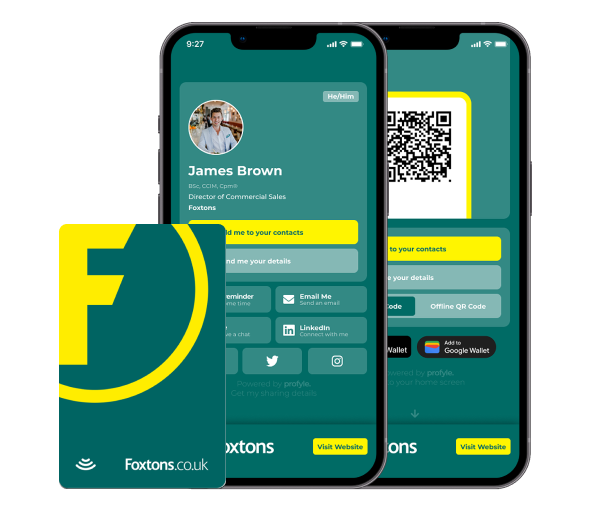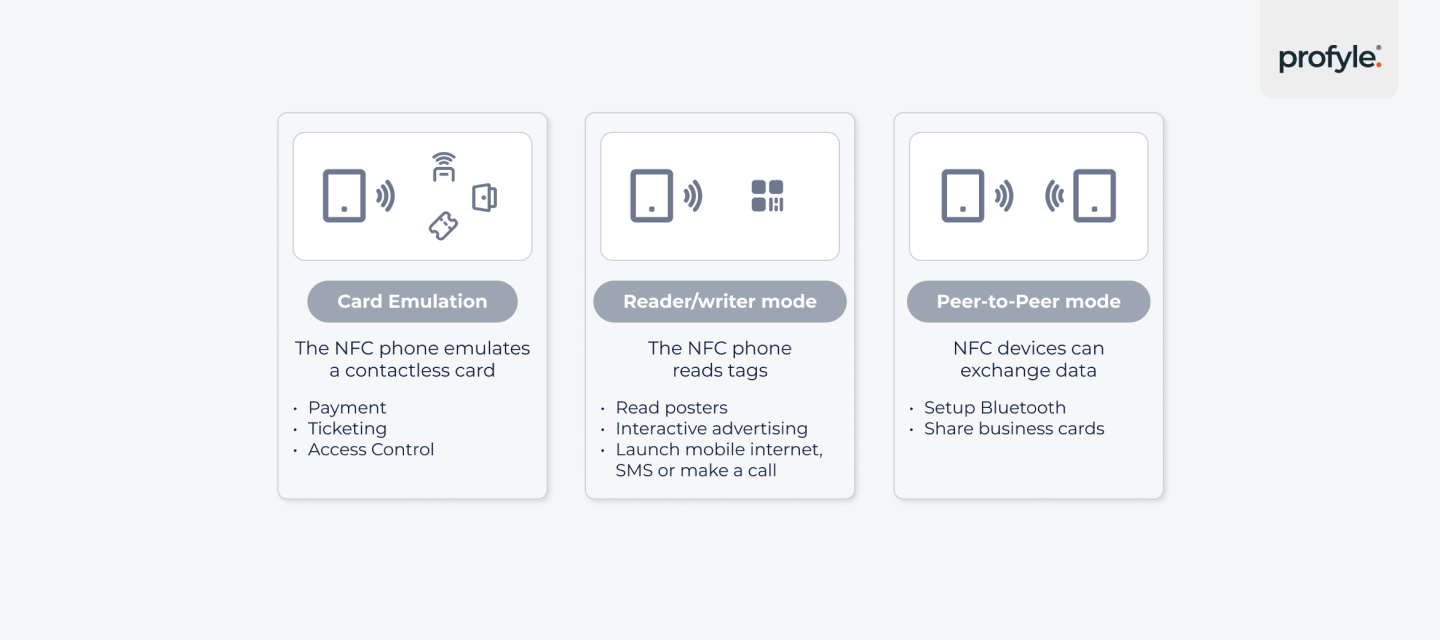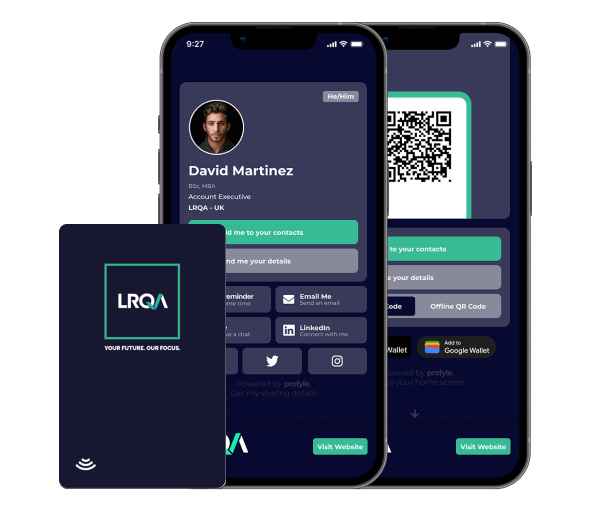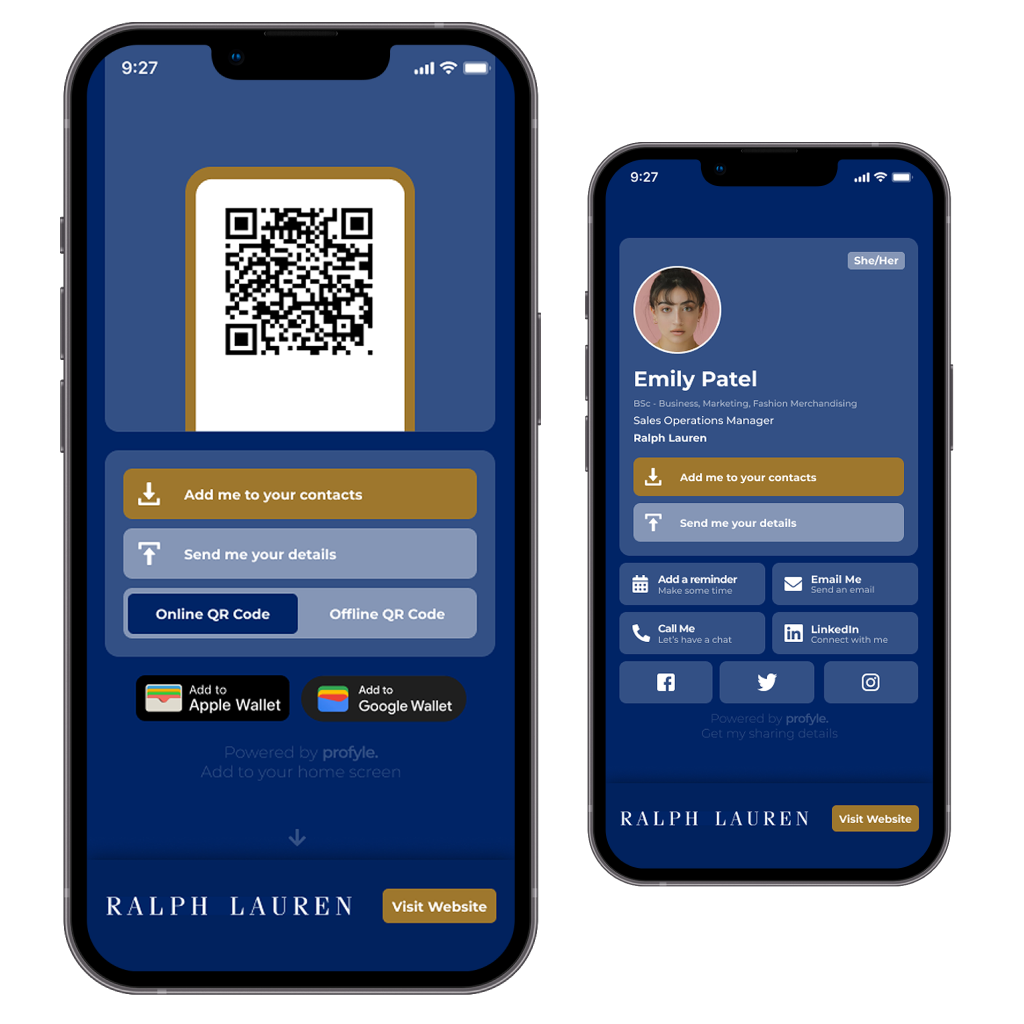Have you ever entered a business meeting wishing to leave a lasting impression without saying a word? Well, that’s exactly what NFC business cards are designed to do.

Getting to know NFC cards
NFC business cards are smart, digital cards that use Near Field Communication technology. This is the same technology that lets people make payments with a quick tap of a phone.

NFC isn’t just for paying. It can be used to share all sorts of information – including business contacts – with just one small gesture. Instead of handing over a paper card, just lightly place your NFC business card or your phone close to someone’s phone. Your contact info will be shared instantly. It’s fast, easy, and keeps everything in one place.
What is a NFC Business Card?
A NFC business card is two things in one. First, it is a physical NFC card you can use to tap to bring up your virtual business cards as an alternative to paper business cards. Secondly, it is the virtual business card. The virtual card is simply a landing page that pops up after the tap.

At first glance, the physical card might look like any other business card, but instead of being printed on paper, it is a small, smart card with a chip inside.
When you tap the card on someone’s phone, the virtual card opens up just like a web page. That page can contain contact information, website links, social media profiles, or even a portfolio of your work. All of that information is designed to match your brand and is instantly shared with your contact. Making your networking quick and effortless.
Why Use NFC Cards?
Why do people turn to NFC business cards? Here are the top three reasons we found at Profyle providing tens of thousands of professionals with digital business cards.
NFC Business Cards are Practical

Say you’re at a conference or a networking event. You meet dozens of people in a short time.
Rather than juggling a pile of paper business cards, you can share your information with one easy touch. You can share your contact details, website, and social media links all in one go. Or even your success stories and references. This keeps your networking neat and organised, without the risk of lost cards or forgotten names.
NFC Business Cards are Convenient
One of the most popular reasons people use NFC business cards is for convenience.

Traditional business cards can be bulky, easy to misplace, and hard to update. If you change your phone number, job title, or even company, you would need to reprint all your cards. With an NFC card, updating your details is simple. You just update the information linked to your card in a web portal, and everyone will get your most current details.
NFC Business Cards are Eco-Friendly

Another reason people are choosing NFC business cards is the environmental benefit. One digital card can replace thousands of paper cards. Plus, since they can be updated live, you do not need to do reprints. Think of the savings not only for your wallet but for the environment.
In the big picture, businesses are looking for ways to be more sustainable. In that regard, NFC cards can substantially reduce your paper use and lower your carbon footprint. By switching to digital business cards, your company can save on printing costs and help cut down on waste. It’s a small change that makes a big difference over time.
5 Steps to Create Your NFC Card
Here’s the fastest way to make a great NFC card for you or your team. As a result of this workflow, you get:
- A branded physical NFC business card. With a free sample, if you want to order cards for a larger team.
- A bespoke design for the virtual card.
- Access to an easy web portal to manage contact details, design, and integrations.

How to Make a NFC Business Card
1. Start a free trial of Profyle.

One of the easiest ways to get started with NFC business cards is by taking advantage of Profyle’s free trial. We allow you to try out our platform for free before committing.
You can sign up for a free trial that gives you access to all the essential features. This trial allows you to experience first-hand how virtual business cards work risk-free. But that’s only the start.
2. Get your free demo NFC card.
If you run a legitimate business, you can also order a free custom branded NFC card from Profyle.
Our team will work with you to create a custom branded NFC business card of your dreams.
You can also do that later, once you’ve signed up. You’ll be prompted to enter your business information. This includes basic details like your name, job title, phone number, email, and website. After completing your registration, you can use our admin panel to order the free card.
3. Design your NFC business cards according to your brand and use case.

Next, it’s time to customise your NFC business card according to your brand. Profyle offers a range of design options, so you can tailor your card to match your business identity.
Profyle allows for personalised branding, meaning you can upload your company’s logo and select colours that match your brand. You can even choose to include a QR code, which works alongside the NFC technology to give you more flexibility in how people access your details.
If you’re not sure about the design, Profyle’s team can help you create a professional and sleek card.
4. Show your people how easy it is to use them.

Once you have your card ready, the next step is to show others how easy it is to use. Profyle’s NFC cards are simple — people only need to tap their phone on your card, and all your information appears instantly on their screen.
We can guide you through how to help get your people started faster.
5. Voilà! Use your cards to create your magic.
Now that you have your personalised NFC card, it’s time to put it to use.
Start sharing it at meetings, conferences, or even casual coffee chats. Each time time you tap your card, someone will be impressed by the ease and speed with which they can see and save your information. Profyle’s cards can also track interactions, giving you insights into how often and where your card is being tapped.
How to use NFC business cards
A single move with your new NFC card or phone and everyone you meet can access everything you want to share. Without the hassle of typing in details or keeping track of paper materials.
-
Always Have It Ready
NFC business cards are only useful if you’re prepared to use them. Instead of digging around for a paper card in your wallet or bag, keep your NFC card easily accessible. Since you only need one card, this is simple. You can place it in a phone case, attach it to a keychain, or even wear it as a badge during events.
-
Make Sure Your Information is Up-to-Date
One of the greatest strengths of an NFC business card is that it can be updated at any time. This means that you don’t have to worry about handing over outdated contact details. However, it’s important to regularly check and update the information stored on your NFC card. Whether it’s a new job title, phone number, or updated portfolio, you want to make sure that the information people get from you is current and accurate.
-
Tailor Your Card to the Audience
Profyle’s NFC business cards allow you to design the layout of the virtual page people see when you use your card. This matters because you only have a few seconds when you have the full attention of someone.
Take advantage of this feature by tailoring your information to the people you meet and the events you attend. You can do that by creating an unique layout inside Profyle. It is easy and you can do unlimited layouts.

For example, if you’re attending a real estate event, include links to your current listings and virtual tours. If you’re a retailer at a relevant business conference, share links to your professional website, LinkedIn, and recent projects.
-
Highlight Key Information
You want to make sure that people easily find the information that matters most when they tap your NFC card. Whether it’s your phone number, website, or a portfolio of your work, make the important details easy to access. You can also add videos, testimonials, or special offers to engage clients. The goal is to make your digital profile informative but not overwhelming.
Tip: Think of your audience and add just enough. But not too much.
-
Use Videos and Multimedia
One of the best features of NFC business cards is the ability to include multimedia. Videos, virtual tours, or even PDFs can all be linked through your card. This is particularly useful in industries like real estate or sales, where visual content can make your message more compelling. Instead of just sharing a phone number or email, link to a video intro or a property tour. It gives people an interactive experience.
Consider: JPMorgan is one of the world’s largest banks, however some of its videos on YouTube only get a few hundred views. A video targeted at small business owners, that can take $10,000+ dollars to produce can pretty much double its view count of 293 simply by adding it to the digital business card of their people canvassing a SMB conference.

-
Intelligent Tracking
NFC business cards offer tracking and analytics. Many NFC business card platforms provide data on how many times your card has been tapped and where those taps occurred. This is valuable for follow-ups and lead generation. By knowing who engaged with your card, you can also prioritise your follow-up efforts and focus on the leads most likely to convert.
-
Automatic and Prompt Follow-Ups
Even with the most advanced tools, human connection still matters. After you use your NFC card, make sure to follow up. Whether it’s sending a personalised email or connecting on social media, the quick follow-up helps solidify the connection. With Profyle, you can even automate the initial follow-up message. Plus, you can integrate your Profyle NFC card with your CRM to set up more advanced message sequences. Both HubSpot and Pipedrive offer helpful guides on how to do that.
Since the information from your card is already stored on their phone, it makes it easier for them to remember who you are.
NFC business cards vs traditional ones
Sadly, statistics show that billions of paper business cards are still being printed worldwide. With massive amounts of cards exchanged every year, most only to be forgotten in a few days.
NFC business cards are different from regular business cards in more ways than one. A traditional business card is static. Once it’s printed, the information on it can’t change. If you switch jobs, move to a new office, or get a new phone number, you’ll have to print all your cards again.
With an NFC card, your information is stored digitally and can be updated at any time. When you share your card, people always get the most up-to-date details, which means fewer mistakes and better connections. There are additional benefits
- You can create a smoother way for people to get to know you. Creating business opportunities out of cold prospects.
- You will be more memorable. You can improve brand recall straight on the spot and afterwards with automated follow-ups.
- No more worrying about running out of cards at an important meeting.
- No need to carry a stack of cards everywhere you go. With NFC, everything you need to share is right in your purse or pocket and ready at a moment’s notice.
- It is wise to consider that millennials and Gen Z now make up a larger part of the business world and of consumers. They prefer quick, digital interactions over paper.
In Conferences
As you can well imagine, one of the key uses of NFC business cards is networking at events.
In busy situations like conferences, meet-ups, or trade shows, you might meet a lot of people in a short amount of time. With traditional business cards, you would hand out paper cards,nwhich could easily be misplaced or forgotten. But with an NFC card, the person you meet can see and save your details instantly. It makes the process quicker, smoother, and easier to remember.
For Sales

Another common use for NFC business cards is in sales. If you work in sales, you’re constantly meeting new clients. Rather than carry around stacks of business cards, you can use one NFC card to share all your contact information with ease. You can even include a link to a presentation or a product demo, making the first interaction more engaging and professional. This makes it more likely that your client will remember you and get in touch later.
For Estate Agents
Real estate agents can use NFC business cards to share property details instantly. When a client taps the agent’s NFC-enabled card with their phone, they can view listings, floor plans, pricing, and even virtual tours. This gives buyers quick access to key property info. They won’t need paper brochures or endless online searches. It’s especially useful at property showings, where buyers want detailed information right away
NFC business cards let agents include multimedia content like videos and 3D virtual tours.
This feature is perfect for showcasing homes. That’s clients these days prefer interactive, digital experiences and NFC cards can deliver a virtual tour to the client’s phone. This is better than a static paper card or flyer. It makes it easier to get an immersive feel for the property.
Additional points to consider:
- One of the key advantages of NFC cards is that they can be updated digitally. Real estate listings can change rapidly. Agents no longer need to print new cards or marketing materials every time a property’s status changes. Instead, they can simply update the digital information linked to their NFC card. The next time someone taps the card, they will receive the most current details
- NFC business cards also help real estate agents track client engagement. When a client taps an agent’s card, it can register the interaction. This gives agents data on who viewed the listings or sought more info. This makes follow-up much easier and more effective. Agents can identify which leads are serious buyers based on how they interact with the digital content.
For SMBs, Trades, and Freelancers
Small businesses are also using NFC business cards. If you’re a photographer or own a small plumbing business, you can link your NFC card to an online portfolio of your work. This allows potential clients to see your skills right away, without having to search for your website later.
It’s an instant way to make a strong impression.
One interesting stat that shows how useful NFC business cards are comes from research on contactless technology. More than 75% of people prefer using contactless methods when possible for payments. That was back in 2020! This means most people already understand how NFC works, and tapping a card is a familiar and comfortable action. Plus, digital sharing removes the risk of misplacing a card, which can happen easily with paper cards.

The Cost of NFC Business Cards
When considering the switch to NFC business cards, it’s important to look at the cost. Many professionals and businesses may assume that NFC business cards are costly. They use advanced technology, after all.
However, when you break down the costs over time, NFC business cards may be cheaper both short-term and long-term. With additional financial benefits too boot.
5x-7x Cheaper with Better Value
Profyle’s NFC cards, cost only £7.95 per card per year. Plus, you get the first card for free! Compare that to the cost of a stack of premium, high-quality cards from a reputable buyer.

Caption: Pricing and cost taken in September 2024 from Moo.com.
The cheapest list price you can get is 50 premium cards for $39 at Moo. For any active networker, at best that’s 2–3 months worth of cards. For a customer-facing professional, that may not even last a month. Even if that lasts you a year – that still makes Profyle 5x-7x cheaper.
As good as these cards are, they come nowhere close to the magic you can provide with Profyle digitally.
- An easy all-in-one platform for managing all your business cards across your company. Need to change someone’s details or your business address? Just a few clicks, you’re done!
- Unlimited layouts let you design different layouts for specific occasions or departments. Need the cards for sales to be a bit different from management? Done in just a few minutes of tinkering.
- Plus, the cards are super easy to use for regular employees who are not tech-savy.
- Your team wants a physical card? No problem. Simply order a branded one from Profyle.
That’s just the tip of the iceberg. There’s so much more you will miss out with paper cards.
No Reprints
One of the most significant cost-saving advantages of NFC business cards is that they are reusable.
With paper cards, every time you update your contact information or move to a new company, you need to print new cards. This not only wastes money but also time and resources. NFC business cards, on the other hand, store your information digitally. If you change your details, you can update the information linked to your card instantly, without needing to order new ones
More Value
NFC business cards have more features than traditional ones. These features add value, not just cost. Many NFC cards let you add multimedia, like videos or links to a website, portfolio, or social media.
Traditional cards would need bulky printed materials to include this much info. Those would be expensive to design and print.
More Durable
Paper business cards can easily get damaged, torn, or lost. This means you’ll need to keep a large supply on hand to replace them constantly. NFC business cards, however, are designed to be durable. They are often made of plastic, metal, or other materials that can withstand everyday use.
You won’t have to frequently replace your NFC card, saving you money and time.
Integrating Your Card
Connecting to CRM Systems

CRM systems are a must-have for managing relationships with clients and leads. That’s why it is a good idea to link your NFC business card to a CRM system. It will import contact details into your database when someone taps your card. This makes it much easier to keep track of new connections, without the need to manually input their information.
For example, you can link your Profyle NFC business card directly with your Pipedrive and HubSpot accounts in just a few seconds. Or use webhooks to connect with other CRM providers.
Email Marketing Platforms

Email marketing remains a powerful tool for reaching potential clients and staying in touch with your audience. NFC business cards can be integrated with email marketing platforms like Mailchimp or Klaviyo. When a person taps your NFC card and inputs their information, they can be automatically added to your mailing list.
Syncing with Calendar and Meeting Tools
Integrating your NFC card with calendar tools can simplify scheduling follow-ups. Use tools like Google Calendar, Calendly, or Microsoft Outlook. After tapping your card, clients can book an appointment with you. This eliminates the back-and-forth of finding a time to meet.
Lead Generation
One of the standout features of NFC business cards is their ability to track interactions and generate leads. By connecting to digital analytics tools like Google Analytics, you can track your card’s usage. You can see how often it’s tapped, which content is accessed, and where the taps occur.
This data can be incredibly valuable for improving your networking strategy. If you notice that certain pages or pieces of content on your card are more popular, you can adjust your approach to focus on what engages people the most.
FAQs About NFC Business Cards
How can I make a business card with NFC?
To create an NFC business card, you can use services like Profyle. Thisinvolves:
- Starting with a free trial to see how the platform works.
- Filling in your business details, including contact info, social media links, and more.
- Customising your card by selecting the design and colours that match your branding.
- Receiving your NFC card and demonstrating your team on how it works.
- Putting it into use in your business.
Profyle and other platforms make it easy by providing templates and guidance. You can visit Profyle to learn more about starting a free trial.
Can I use my phone as a NFC business card?
Yes, you can use your phone as an NFC business card. Many platforms, like Profyle, use your phone’s NFC functionality.
By tapping another person’s phone, you can share your contact info, website, or social media profiles. There’s no need for a physical card. This is a convenient option for those who prefer a fully digital experience.
Do NFC business cards work without the internet?
Yes, NFC business cards can work without an internet connection. When someone taps your NFC card, the data (like your contact information or a link) is transferred directly between the card and their phone.
What is the difference between NFC and RFID business cards?
NFC and RFID are both wireless technologies. But, they serve different purposes.
- NFC works over very short distances (a few centimeters). It’s used for quick info exchange, like business cards and contactless payments.
- RFID can work over longer distances and is often used for tracking items or inventory.
NFC business cards are for close, personal interactions. RFID cards are for broader uses, like logistics and access control.
How long do NFC business cards last?
NFC business cards are durable and can last for several years. Since they are typically made from plastic, metal, or eco-friendly materials, they are resistant to wear and tear.
Also, the card’s info is updated digitally. It stays relevant unless the card is damaged. So, it doesn’t need replacing. NFC chips themselves are designed to last for years with regular use.
How does NFC differ from QR?
Both NFC and QR codes can be used to share information with digital business cards, but they differ in how they work:
- NFC uses near-field communication to transfer information instantly when tapped by a phone.
- QR codes require the recipient to scan a printed code with their phone camera, which can sometimes take more time and effort.
NFC cards are faster and more seamless than QR codes. But, QR codes are more universal. All smartphones can read them, even those without NFC technology.
Are NFC business cards worth it?
NFC business cards are a smart investment for professionals. They are a fast, eco-friendly way to share contact details. Branded cards help you stand out when networking. They make a stronger, more memorable impression.
Surpisingly, their cost can be lower when compared to traditional paper cards. Also, their durability, customization, and reusability make them cost-effective.













